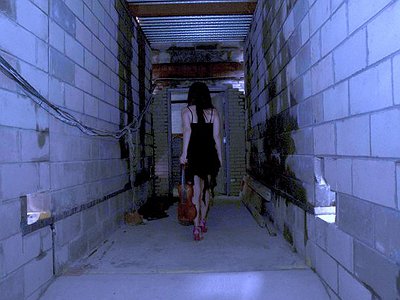In how much, do you feel, are creative decisions shaped by cultural differences – and in how much, vice versa, is the perception of sound influenced by cultural differences?
I think we are all in a sense, products of our environment. Having said that, coming from Canada and having been classically trained and having grown up on everything from Top 40 to eastern gypsy, jazz, and country, it's a bit challenging to decipher a distinct culture of influence for myself and in my sound. Having said that, I do believe that there might be something inherent in my ancestry or soul that could be perceived as Eastern or Asian sounding.
I don't know that it's a fact, but I think there is a definite perception or pre-conceived notion. I believe that each culture does perceive something distinctly, and yet not necessarily correctly as being Scandinavian or Eastern, Latin, Slovak or African etc.
The relationship between music and other forms of art – painting, video art and cinema most importantly - has become increasingly important. How do you see this relationship yourself and in how far, do you feel, does music relate to other senses than hearing alone?
I am a visual person and whether consciously or not, I bring that influence into my compositions. I believe that the perceiver is listening with their ears as well as the eyes. Sound stirs the emotion, touches the soul, and moves the heart in the purest way. Music inspires visual art and vice versa.
There seem to be two fundamental tendencies in music today: On the one hand, a move towards complete virtualisation, where tracks and albums are merely released as digital files. And, on the other, an even closer union between music, artwork, packaging and physical presentation. Where do you stand between these poles?
Technology is not only making music and art more accessible but it is in itself a new type of art. I don't see it as a negative as long as its function accessible to all and helps to discover more bands and artists that would otherwise not be heard or seen.
I believe both culturally and artistically that it's important to keep a certain tradition of artwork, packaging, and physical presentation. It's a more personal way to be connected with each other for both the artist and the fans.
The role of an artist is always subject to change. What's your view on the (e.g. political/social/creative) tasks of artists today and how do you try to meet these goals in your work?
It is a personal thing. On one hand, I don't believe that the role of an artist entails holding a type of political view or that one has to be involved in any tasks or be responsible for influences outside their creativity. But on the other, our culture is vastly influenced by media and the arts. Art exists for a purpose bigger than temporary escapes or pleasure. If any given person is on the radar, they naturally become a person of influence. How they act or carry themselves or the choices they make, do count for something and does have an impact on society.
We live in a time where it's necessary for artists to seek more knowledge and be curious. I see what I do as being a part of something larger than myself. It has become in a sense, a task, and it's about sacrifice and selflessness.
I've found it worthwhile and sometimes more satisfying to hear just one person tell me how a performance affected them or gave them peace or healing, than a standing ovation and flattery. When it's about me, I limit the miraculousness and potential of it. I believe we all have something to contribute that the world is in desperate need for.
Music-sharing sites and -blogs as well as a flood of releases in general are presenting both listeners and artists with challenging questions. What's your view on the value of music today? In what way does the abundance of music change our perception of it?
With the advancement of technology and how easy they're making it, I think it's encouraging more people to create music. Websites such as YouTube and Soundcloud are definitely offering more opportunities to showcase. Good music will stand as good music no matter what.
How, would you say, could non-mainstream forms of music reach wider audiences?
That is the question. I have been noticing more so that for whatever reason, commercials seem to be using more music from unsigned/indie artists/bands. That is one outlet. Even the internet is flooded. Word of mouth is important. Being creative with social media and creating a buzz.
Usually, it is considered that it is the job of the artist to win over an audience. But listening is also an active, rather than just a passive process. How do you see the role of the listener in the musical communication process?
As a performer, my role is to bring the best that I can to each performance and to hopefully engage an audience from the first note. The role of a performer is an act of service, in a sense. The role of a listener is to be engaged to a certain extent. It's give and take. I give what I get back. There is always a certain level of energy that is created together.
Reaching audiences usually involves reaching out to the press and possibly working with a PR company. What's your perspective on the promo system? In which way do music journalism and PR companies change the way music is perceived by the public?
I have been sometimes passive with interviews in the past. Music journalism, media, PR, etc puzzle me at times as far as how I feel I'm communicating myself, yet sometimes it's very clear that there are certain selling points and they hit on those pretty consistently. I think as with all types of media, it's about creating a story and I take all of it with a grain of salt.
Please recommend two artists to our readers which you feel deserve their attention.
Find out more about Judy Kang at www.judykang.com



